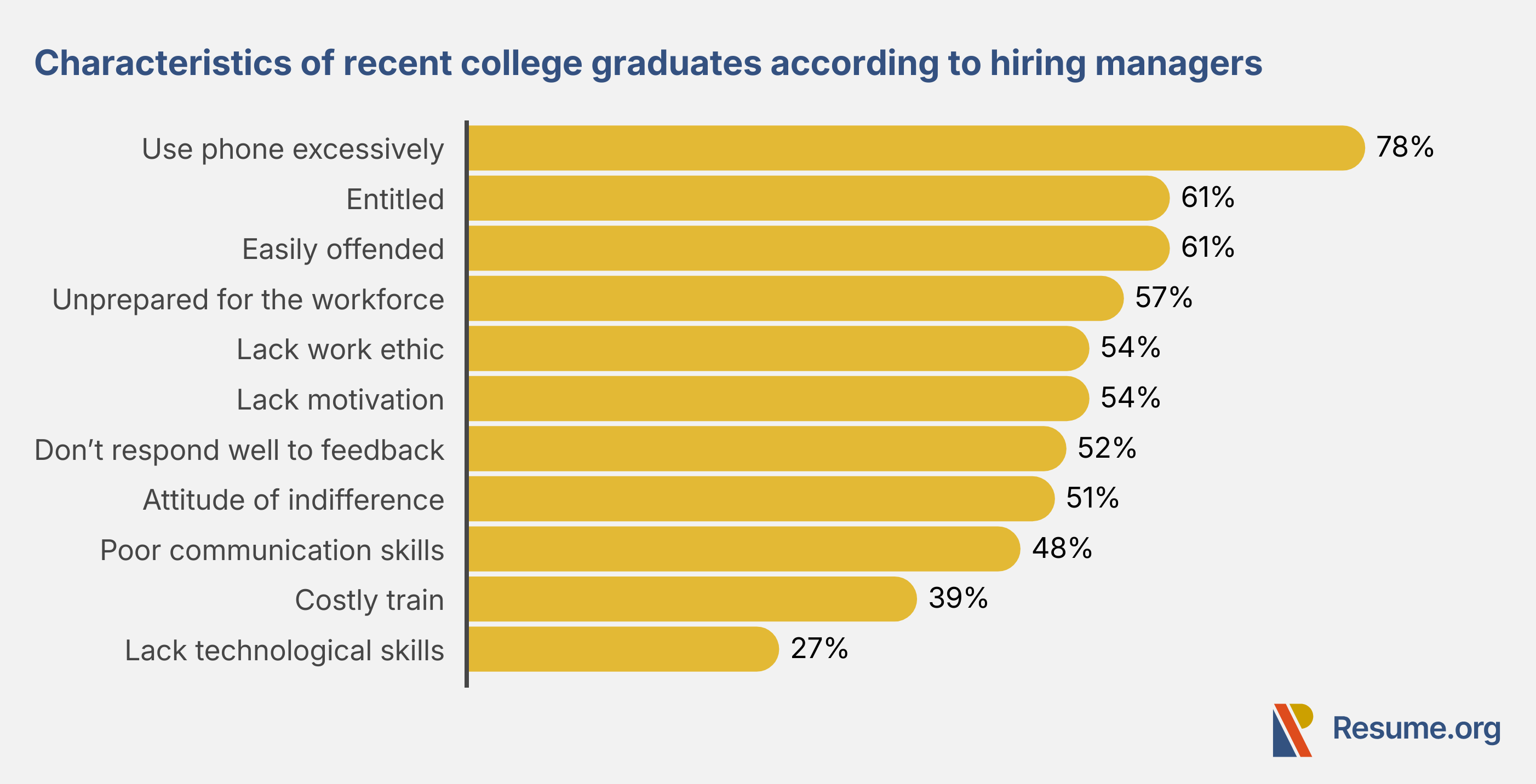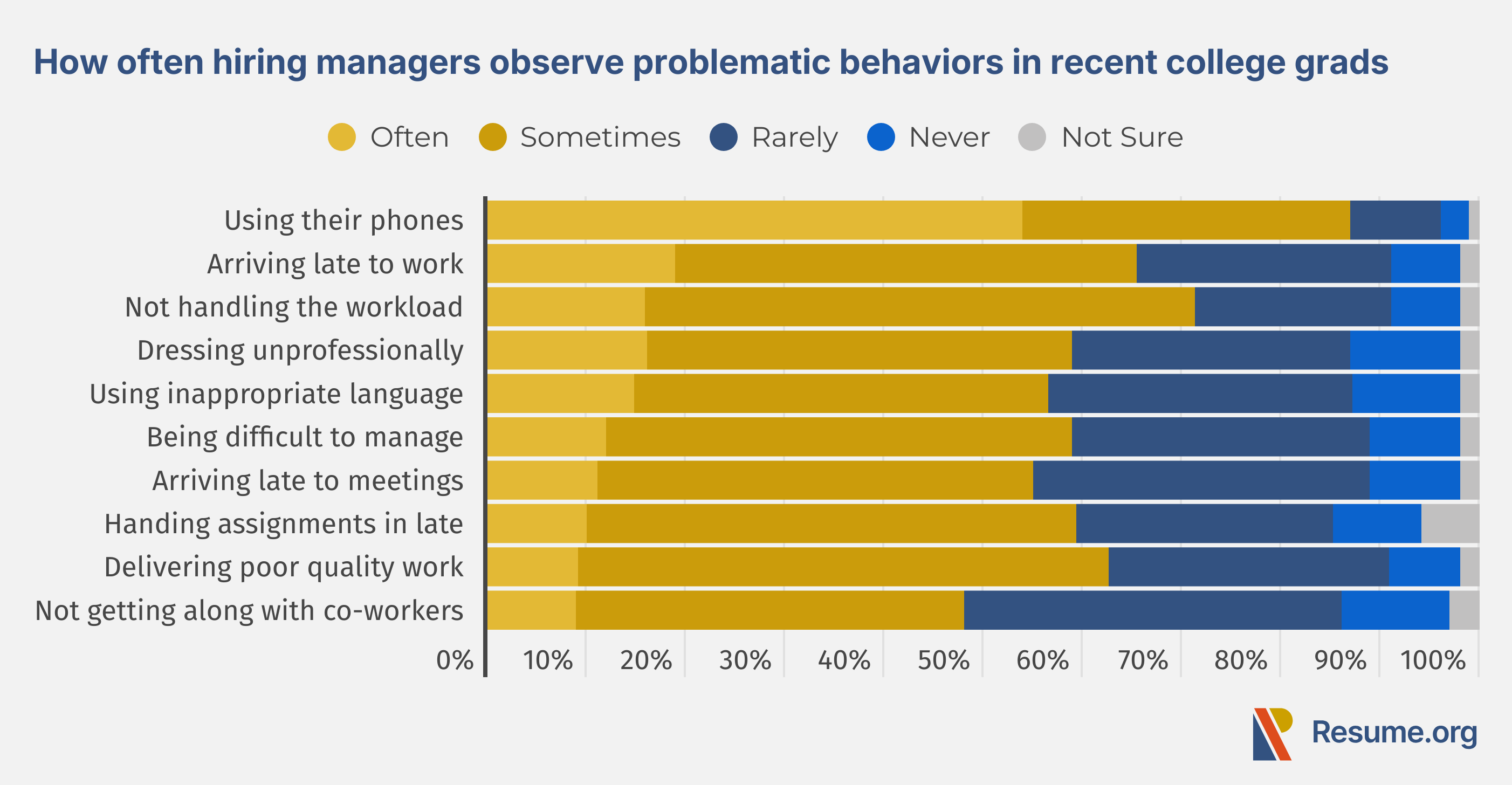The class of 2025 college graduates is entering a difficult job market. Not only is there economic uncertainty, but hiring managers also express skepticism about the capabilities and professionalism of young workers joining the workforce.
Resume.org surveyed 1,000 hiring managers in April to understand how they feel about hiring recent college graduates and what challenges they’ve encountered with this group.
Takeaways:
- 8 in 10 hiring managers say a recent college graduate didn’t work out at their company in the past year, and 65% say they had to fire one
- 78% of hiring managers say recent grads spend too much time on their phones
- More than half say recent grads are unprepared for the workforce and difficult to manage
- 1 in 6 are reluctant to hire this cohort
- Only 58% of companies say they will consider hiring from the graduating class of 2025
8 in 10 Hiring Managers Report Recent College Grads Struggled on the Job
Most companies (90%) say they hired recent college graduates in the past year. However, only 17% of those companies say all of these hires were successful. The majority, 70%, say that only some of the hires worked out, and 13% say that only a few of their recent grad hires worked out. Additionally, 1% say that none of them were successful.
Among the companies where recent grads didn’t work out, the top issue was a lack of motivation or initiative (48%). Other common problems included a lack of professionalism (39%), excessive phone use (39%), poor time management (38%), and an attitude of indifference (37%). Many also cite poor communication skills, difficulty handling feedback, and an inability to adapt to company culture.
As a result, 70% of hiring managers say some of these hires were placed on performance improvement plans, and 65% say they had to fire at least one recent college graduate within the past year.

“Colleges don’t teach students how to behave in the workplace, and there is a lack of transitional support from both universities and employers,” says Resume.Org’s Career Coach Irina Pichura. “Most students graduate with little exposure to professional environments, so when they arrive at their first job, they’re often learning basic workplace norms for the first time. Colleges should have a workplace training program to support graduates’ transition to the workplace.”
Hiring Managers Say Recent Grads Are Unprepared for The Workforce, Entitled, and Spend Too Much Time on Their Phones
In general, many hiring managers believe recent college graduates are not meeting basic workplace expectations. Roughly 61% say they’re entitled and get offended too easily. Also, more than half believe they are unprepared for the workforce, lack motivation, and don’t have a strong work ethic. Other common criticisms include acting indifferent, struggling to accept feedback, lacking communication skills, and being too costly to train.
These impressions are reflected in managers’ day-to-day experiences. The most common issue is excessive phone use, with 87% reporting that recent grads are often or sometimes on their phones during work hours. Similarly, 72% say these employees often or sometimes struggle to manage their workload, and 60% say they turn in assignments late.
Tardiness is also a concern: 66% say recent grads are late to start work often or sometimes, and 55% say they are late to meetings. Additionally, 62% say they often or sometimes deliver poor quality work, and 59% find them difficult to manage at least some of the time. Concerns around professionalism are also common. More than half (58%) of managers report that recent grads often or sometimes fail to dress appropriately, and 56% say they don’t always use proper workplace language.

1 in 6 Hiring Managers Are Reluctant To Hire Recent College Grads
Only 58% of companies say they plan to hire from the graduating class of 2025, reflecting growing hesitation among employers. About 17% of hiring managers admit they feel apprehensive about hiring a recent Generation Z (Gen Z) college graduate for an entry-level role (14% say they are somewhat hesitant, and 3% say they are extremely hesitant).
When asked what would make them more inclined to hire Gen Z candidates, hiring managers often point to traits tied to attitude and accountability. Top qualities include showing initiative (57%), exhibiting a positive attitude (53%), demonstrating a strong work ethic (52%), being adaptable (51%), and being open to feedback (50%). Other appealing traits include punctuality, strong interpersonal skills, and solid technical abilities. In contrast, relatively few managers say factors like avoiding political talk or having a polished social media presence would influence their decision.
Pichura discusses how college students can demonstrate they have a strong work ethic as well as the ability to take initiative during the interview process.
“During the interview, candidates should come prepared with ideas and research. It’s not enough to just glance at the company website,” says Pichura. “Bringing insights about the company’s goals, challenges, or industry trends, and asking thoughtful questions, signals curiosity and initiative. Interviewers don’t want to hear generic statements like ‘I’m a hard worker.’ Use real examples — stories where you stepped up without being asked, solved a problem, or went beyond your role. The Situation, Task, Action, Result (STAR method) works well here.”
“Ask questions like, ‘How do you typically give feedback?’ or ‘What does success look like in the first 90 days?’ to show you’re thinking about performance and growth. And always follow up with a well-written thank-you email that references the conversation and reaffirms your interest in the role. It’s a simple but powerful way to show attention to detail and follow-through.”
Demonstrating initiative and a strong work ethic shouldn’t stop once the interview is over. Pichura shares how recent grads can continue to stand out after they’ve landed the job.
“Even in an entry-level role, new hires can stand out by looking for small ways to own tasks, solve problems, and offer solutions before being asked,” says Pichura. “Volunteering for stretch assignments and asking for feedback shows a desire to grow. Initiative isn’t just about starting something; it’s about improving. Being reliable, meeting deadlines, and treating every task with care and intention builds trust and credibility early on.”
Methodology: Resume.org commissioned this survey, which was conducted via Pollfish in April 2025. A total of 1,000 U.S. workers participated. Demographic and screening criteria ensured that all respondents hold management-level positions and are involved in hiring for entry-level positions.
To view all of our other research and studies go to our research page.
Resume.org offers free, HR approved resume templates to help you create a professional resume in minutes. Choose from several template options and even pre-populate a resume from your profile.